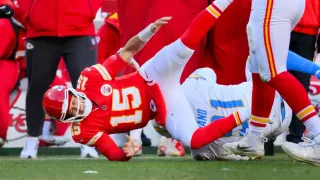Feb 10
Trump Takes Over Kennedy Center and Bans Drag Shows – 'THIS WILL STOP'
READ TIME: 3 MIN.
Donald Trump has appointed himself Chairman of the Kennedy Center for the Performing Arts, so don't expect RuPaul to get a Kennedy Center honor any time soon.
The regressive President posted on Truth Social on Friday that he has fired several board members of the Kennedy Center for the Performing Arts in Washington, D.C. and will take the role of Chairman for himself.
"In a statement posted Friday night, representatives for the center didn't push back against Trump's actions, though they did confirm they are unprecedented," The Wrap reported. "The group also touted its bipartisan history, for whatever that's worth now, and said it has received 'no official communications' regarding any of Trump's statements. Ultimately, the group expressed what amounts to meek acquiescence, limply conceding that 'there is nothing' in the organization's statute to prevent Trump from taking such actions and offering no real criticism of the move."
One of his first moves was to axe David Rubenstein – a private equity billionaire and philanthropist who has been the Kennedy Center's largest individual donor in its history – along with other unnamed trustees, Politico reported.
"Rubenstein was set to chair the board until 2026, when he planned to step down after 15 years. It is not immediately clear which other board members have been removed, but the Atlantic, which first reported the news earlier on Friday, suggested Jean-Pierre along with Democratic political strategist Mike Donilon and Democratic National Committee finance chair Chris Korge may be on the list," the site said.
Trump said the individuals he removed "do not share our Vision for a Golden Age in Arts and Culture."
"What would that artistic vision look like?" wondered the Atlantic. "Trump's rallies provide some glimpses into his cultural tastes, with a heavy diet of songs by Village People and Guns N' Roses along with Broadway standards from 'Cats' and 'The Phantom of the Opera.' (He is, evidently, an Andrew Lloyd Webber fan.) He walks onstage to a recording of 'God Bless the USA' sung by the current Kennedy Center trustee Lee Greenwood, who was appointed during Trump's first term."
Trump also appointed Jon Voight, Arkansas Gov. Mike Huckabee, and Attorney General Pam Bondi to the board during his first term, though he never attended any of its gala honors.
Who not to expect at the Kennedy Center? You guessed it: drag artists. "In his social media post, Trump said he would reshape the centre's schedule on conservative lines. The president noted that in recent months, 'the Kennedy Centre featured Drag Shows specifically targeting our youth'. 'THIS WILL STOP,'" Trump said, according to the Times.
Time Magazine reported that "(a)ccording to its website, the center in July hosted a preshow titled 'A Drag Salute to Divas' and a November 'Drag Brunch.'"
NPR's Bob Mondello did a deep dive of drag events at the center. "I looked back through last year's bookings and there were a couple of drag brunches in the Center's rooftop restaurant, a lip-synched Drag Salute to Divas at its free Millennium stage, and a single full-fledged production: comedian Kris Andersson's silly solo show Dixie's Tupperware Party. All those shows are aimed at adult crowds. But Dixie's Tupperware Party played at the Center's 324-seat Family Theater, so named to make it sound more inviting than the much larger Opera House and Concert Hall, each of which has more than 2000 seats. The theater's moniker is, for the record, just a name – I've caught lectures and films at the 'Family' Theater, just as I've seen concerts and plays at the 'Opera House.'"
Blaq Dinamyte, the president of Qommittee, a national network of drag artists and allies, condemned the president's move in a statement Friday. "Banning an entire art form is censorship, plain and simple," Dinamyte wrote.
Perhaps someone should send the President a clip of when Flip Wilson brought his drag character Geraldine to the Kennedy Center Opera House stage in 1983 for an all-star celebration of Bob Hope's 80th birthday. "Ronnie? Where's Ronnie, baby?" Geraldine says as she gazes out looking for President Ronald Reagan, who was in attendance with his wife Nancy. The pair are seen in the clip laughing heartily at Wilson's appearance, which would be banned under Trump's dictum.
"The Kennedy Center is the premier performing-arts institution in the nation's capital. It is home to the National Symphony Orchestra and the Washington National Opera, and it hosts more than 2,000 performances and exhibits a year, including major foreign cultural exports," the Atlantic explained.
First conceived under President Eisenhower in 1955, the move to build a public auditorium for the arts in Washington was taken up by President Kennedy before his assassination in 1963.
The Kennedy Centre finally opened on the banks of the Potomac River in 1971 with a Requiem Mass for the murdered president, reported the Times.






